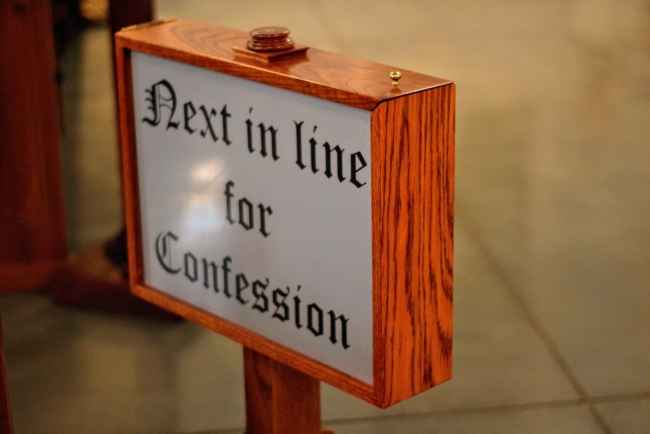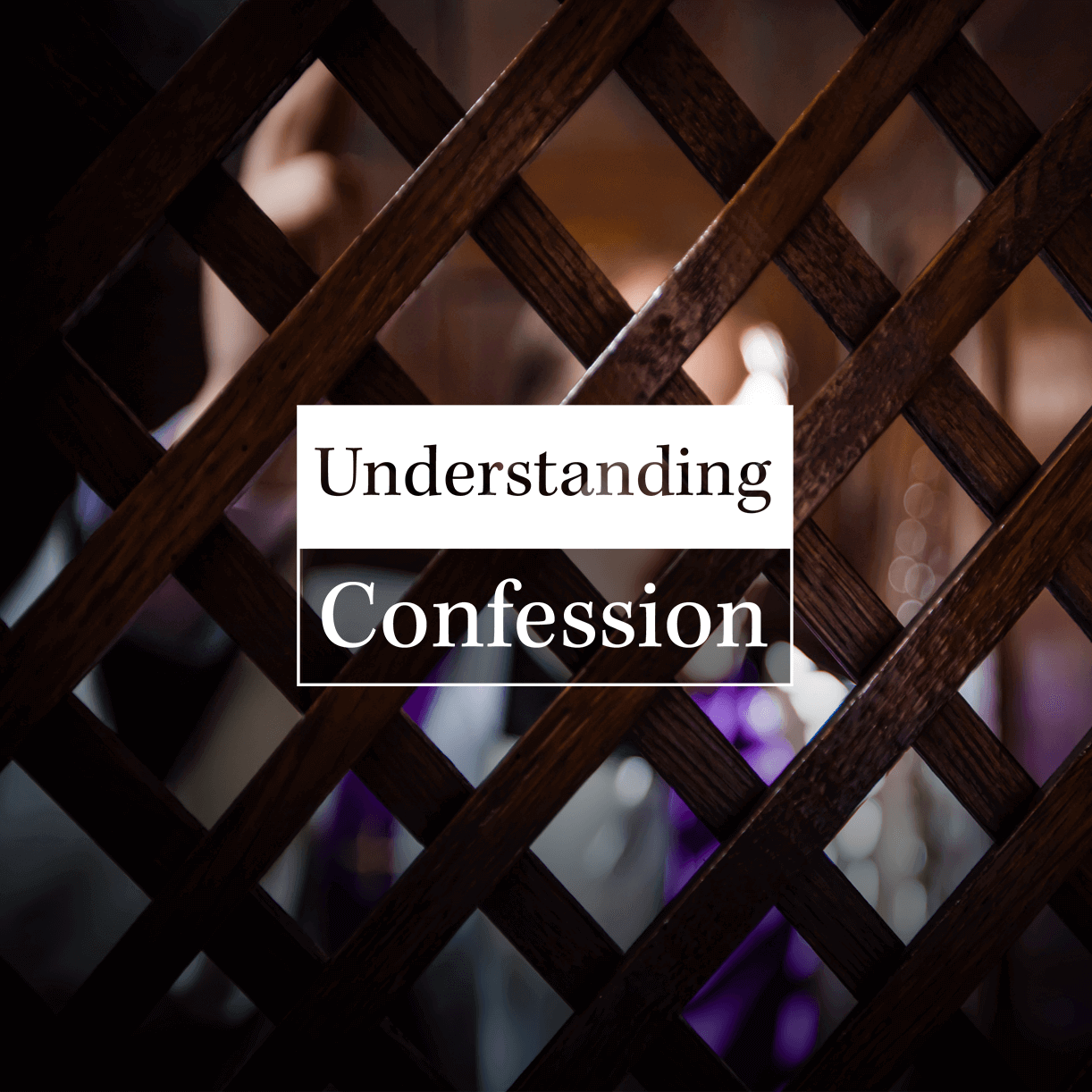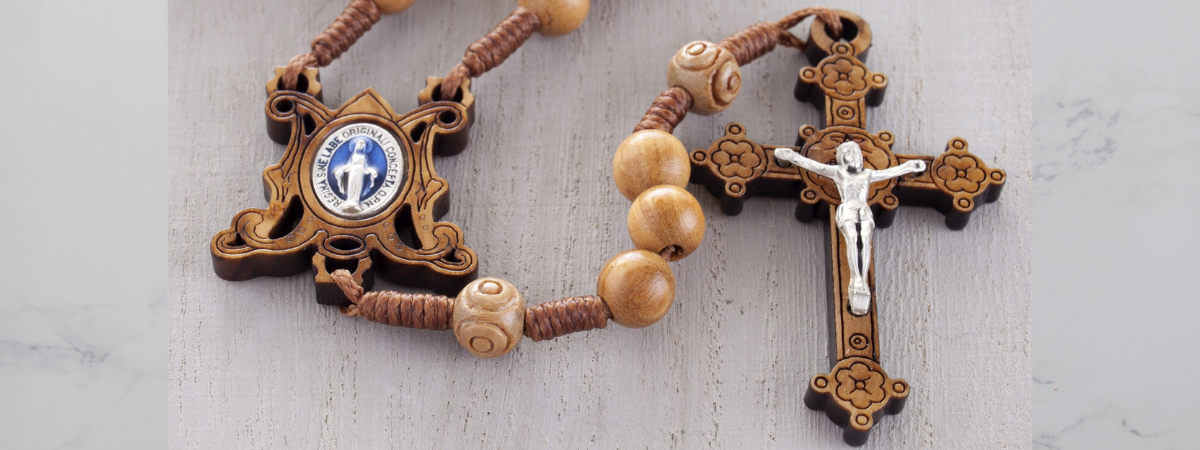The first time I went to confession I was twenty-five years old. I wasn’t quite sure what to do, but I entered the confessional and knelt in silence. I was so quiet that the elderly priest—as I recall—didn’t even know I was there.
When he realized someone was indeed there (after an awkward period of silence) he spoke to me softly and asked a few questions to prompt me.
Probably because I was so nervous, I forgot everything I wanted to say. Finally, I pulled out the folded sheet from my pocket where I had written out my sins, and read through them slowly.
I was acutely aware of the sound of my voice. Although I barely whispered, it felt as though a microphone were hidden in the confessional and that everyone in line could hear each and every sin I mentioned. In the end, I got through my confession, and received absolution.
Although my first confession started off a little shaky, I will always be grateful to the kind-hearted priest who heard it.
I’m not sure what I thought it would be like—perhaps I thought that there would be more shame than relief—but I recall feeling surprised at the lightness and freedom I felt as I left the church.
Confession Is An Act of Surrender
It occurred to me very recently, as I stood in line for the Sacrament of Reconciliation, that trustful surrender takes on new meaning after we have confessed our sins.
When I acknowledge my weaknesses before God and ask Him for forgiveness, I am in a better place to release my will to Him, as well.
In confession we come to Christ who, in the person of the priest, restores the friendship with Him that was altered by sin. God, of course, already knows my sins, but in confessing them I am saying to Him: “I am sorry, Lord, help me not to sin again.”
This is, in itself, an act of surrender.
Touched by God’s mercy and freed from our sins, we have a chance to begin again.
Pope St. John Paul II once said,
“Confession is an act of honesty and courage—an act of entrusting ourselves, beyond sin, to the mercy of a loving and forgiving God.”
Trustful surrender is a spiritual discipline that goes by different names: Abandonment to Divine Providence, Conformity to the Will of God, Trustful Surrender, or Perfect Submission to the Will of God.
All imply the same spiritual principle. In its perfect form, this spiritual discipline is a means to unite ourselves with God so that His will and our will become one thing.
While this discipline might sound simple and straightforward, I’m sure that most of us would agree: it’s not easy to attain. That is because, ultimately, the goal is a denial of self—a complete self-renunciation.
We cannot commit part of our lives to God’s care while keeping other parts under our own control. It is actually an illusion to think that anything is under our own control. Our abandonment to God is actually an acceptance of the reality that He is in charge of all things. Abandonment to God’s providence is simply what it means to live a life of faith. It is a recognition that we do not belong to ourselves, that we have a Creator whom we serve, who loves us, and who orders all things for our good and His glory.
We do not always perceive this, which is why abandonment to God is also called trustful surrender. It is not easy to continually trust God from day to day, but we must put forth the effort until we do it perfectly. Burdens, pain, and suffering make it harder to trust, but it is precisely in these times of trial that our trust in God is strengthened. Even the evil that happens to us is folded up in His loving providence and is ordered for our ultimate good.
Thy Will Be Done, a Good Catholic digital series
Why We Should Make Confession A Priority
Since my first confession so many years ago, I know that when I offer my sins to God, He gives me rest for my soul and the gift of a new start: “Come to me, all you who are weary and burdened, and I will give you rest” (Matthew 11:28).
Sadly, I often find it difficult to make confession a priority—even though there are many other things in my life that I commit to on a consistent basis.

I drive my children to their sports practices almost every day of the week. I find time to exercise regularly. I take my dog to the vet, my kids to the dentist, and my car to get an oil change.
While I hardly think twice about these other necessities of life, it seems that tending to my soul is relegated to the back burner.
Why is this? Perhaps it is because we don’t recognize the terribleness of sin and therefore we simply don’t think about it as often as we should.
Many things in life take effort, and our spiritual life is no different. God is amazingly generous. He richly rewards us for our efforts to conform to His will.
I know that if I truly wish to surrender to the will of God, then I need to make confession a regular part of my life. It must be an intentional priority.
I long for the sense of freedom that reconciliation brings. But I am learning that it takes work. It is one thing to say “I surrender all to you, Lord.” It is another thing to actually do so.
In his book Into Your Hands, Father, Fr. Wilfred Stinissen explains that we often make the mistake of assuming our freedom is somehow opposed to God’s will, but in fact:
“There is a wonderful harmony that exists between a person’s true freedom and God’s freedom. Those who are free (unfettered) give God the freedom to do what He wills. When you are free of all inhibitions and impediments, God is also free to fill you as He wills.”
There is much to be joyful about when we surrender to God’s Providence. God turns all things to good and uses even our sinfulness to work for His glory if we let Him. How wonderful is that? Even when we turn away from God, He never turns away from us.
St. Jerome and the “Gift” of His Sin

I once heard an anecdote from the life of St. Jerome which reveals the humility of Our Lord and serves as a reminder to always make confession a priority:
After many years spent in Jerusalem translating the Word of God, Jerome finished his grand project just days before Christmas. To celebrate his accomplishment, Jerome decided to spend Christmas Eve in nearby Bethlehem, in one of the many grottoes that dot the countryside. According to the ancient account, sometime around midnight Jesus appeared to him, saying “Jerome, what will you give me for my birthday?”
Immediately and enthusiastically, Jerome declared, “Lord, I give you my translation of your word.” But instead of congratulating him, Jesus simply replied, “No, Jerome, that is not what I want.”Jerome was speechless. Then he began to complain and remonstrate with Jesus, asking why he had let him go on for forty years, far from home, laboring at something other than what God most wanted from him. But Jesus remained silent. Jerome started suggesting other ways of honoring Jesus’ birthday—fasting, becoming a hermit, giving his possessions to the poor. To each of these Jesus replied, “No, Jerome. That is not what I want most.”
Finally, Jerome protested, “Then you tell me, Lord. Tell me what would give you the most joy on your birthday, and you shall have it.”
“Do you promise, Jerome?”“Yes, Lord, anything at all.”
Jesus replied, “Give me your sins…”
Included in Mother Teresa’s Secret Fire by Joseph Langford
God wants us to come to Him with everything, most especially our sinfulness, so that He can make us whole: “No one who conceals transgressions will prosper, but one who confesses and forsakes them will obtain mercy” (Proverbs 28:13).
Perhaps we can make confession a priority this Lent.
Meditate with Sacred Scripture

Sirach 2 is a wonderful passage that we can meditate on as we prepare to make a good confession; asking Our Lord to help bring to mind our sins so that we can obtain from Him forgiveness and mercy:
My child, when you come to serve the Lord,
prepare yourself for testing.
Set your heart right and be steadfast,
and do not be impetuous in time of calamity.
Cling to him and do not depart,
so that your last days may be prosperous.
Accept whatever befalls you,
and in times of humiliation be patient.
For gold is tested in the fire,
and those found acceptable, in the furnace of humiliation.
Trust in him, and he will help you;
make your ways straight, and hope in him.
You who fear the Lord, wait for his mercy;
do not stray, or else you may fall.
You who fear the Lord, trust in him,
and your reward will not be lost.
You who fear the Lord, hope for good things,
for lasting joy and mercy.
Consider the generations of old and see:
has anyone trusted in the Lord and been disappointed?
Or has anyone persevered in the fear of the Lord and been forsaken?
Or has anyone called upon him and been neglected?
For the Lord is compassionate and merciful;
he forgives sins and saves in time of distress.
Woe to timid hearts and to slack hands,
and to the sinner who walks a double path!
Woe to the fainthearted who have no trust!
Therefore they will have no shelter.
Woe to you who have lost your nerve!
What will you do when the Lord’s reckoning comes?
Those who fear the Lord do not disobey his words,
and those who love him keep his ways.
Those who fear the Lord seek to please him,
and those who love him are filled with his law.
Those who fear the Lord prepare their hearts,
and humble themselves before him.
Let us fall into the hands of the Lord,
but not into the hands of mortals;
for equal to his majesty is his mercy,
and equal to his name are his works.
Sirach 2
Questions for Quiet Reflection
Do you ever reflect on the terribleness of sin? Do you make an examination of conscience every day?
When was the last time you brought your sins to God in the Sacrament of Reconciliation?
Do you celebrate the mercy of God and look for His mercy in your life?
Have you practiced making an act of faith, an act of hope, or an act of love while you pray?
To learn more about trustful surrender to the Will of God, discover the Good Catholic series, Thy Will Be Done.






